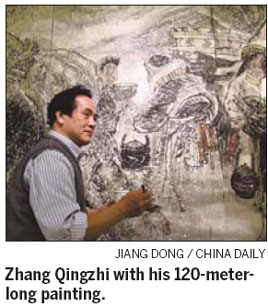

Sitting by his 120-meter-long painting that covers the walls of the exhibition hall, 56-year-old artist Zhang Qingzhi turns emotional.
Gazing at the scenes of relief work in Yushu, Qinghai province, that was hit by an earthquake on April 14, 2010, he says, "Life is so fragile. In the twinkling of an eye, everything can be lost."
The former paratrooper, who was also in the disaster zone in 2008 - when an earthquake flattened Wenchuan in Sichuan province - says while shocked by the scale of the devastation, he was also deeply moved by the mammoth relief efforts, which he expressed in a 120-meter-long, two-meter-high painting.
His work on the Yushu relief has many scenes showing soldiers from the People's Liberation Army helping Tibetans, and national leaders overseeing the relief work.

Asked whether he worries that his paintings will be seen as politically motivated, the usually calm Zhang gets agitated.
"Nowadays, in our society, a strange phenomenon is occurring - anything that is related to the government and officials is often viewed negatively," he says.
"I see no hidden meaning in the central government saving and helping Tibetans in need, so why can't I record the truth in my painting?
"While there are problems in our country, there are also achievements that need to be represented by artists," he says.
Born in 1954, in a Shandong province village, Zhang had a deprived childhood and frequently went hungry. When his mother died, his father found it even more difficult to care for Zhang and his sister, and the boy often resorted to begging.
One day, while nearly dead from starvation, an old woman gave him two sweet potatoes. A grateful Zhang picked up a twig and drew a portrait of the woman, who was surprised to see a striking likeness of her staring back from the ground.
In 1974, the primary schooled Zhang left the village and joined an army unit of paratroopers stationed in Hubei province.
But he would always squeeze some time from his military training to paint. His works, mostly traditional Chinese landscape paintings, gradually began to be noticed in the army.
In 1982, an Air Force magazine took notice of his paintings and took him on as an art editor. This gave Zhang the opportunity to travel across the country, and his new experiences found expression in his works.
In 1990, after retiring from the army, Zhang became a full-time artist and held his first solo exhibition at the National Art Museum of China in 1998.
His works are collected by both museums and private collectors. One of his works - The Ode for World Peace, was presented to former Russian president Boris Yeltsin as a gift.
In Wenchuan, seeing young soldiers risking their lives to save others, moved him to tears. He says witnessing brave paratroopers trying to extricate survivors from blocked mountains made him want to join them, once gain.
"As I saw people put up with the constant aftershocks, I felt like I had found the soul of this nation," Zhang says. On his return from the disaster zone, he spent 28 days pouring his emotions on to canvas.